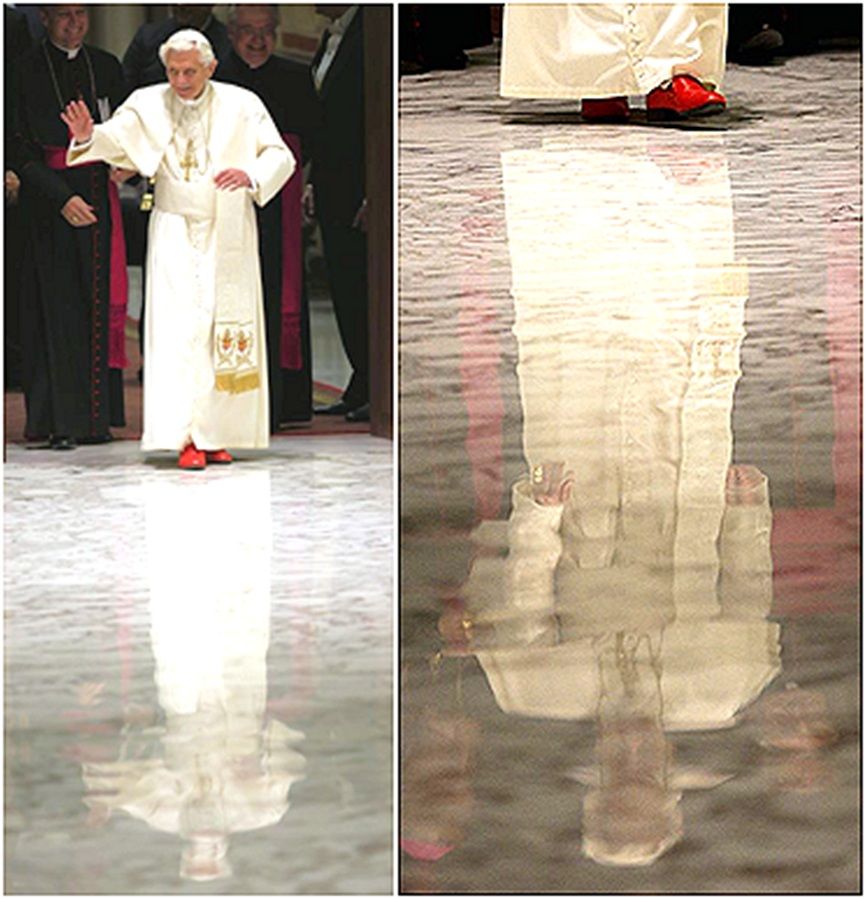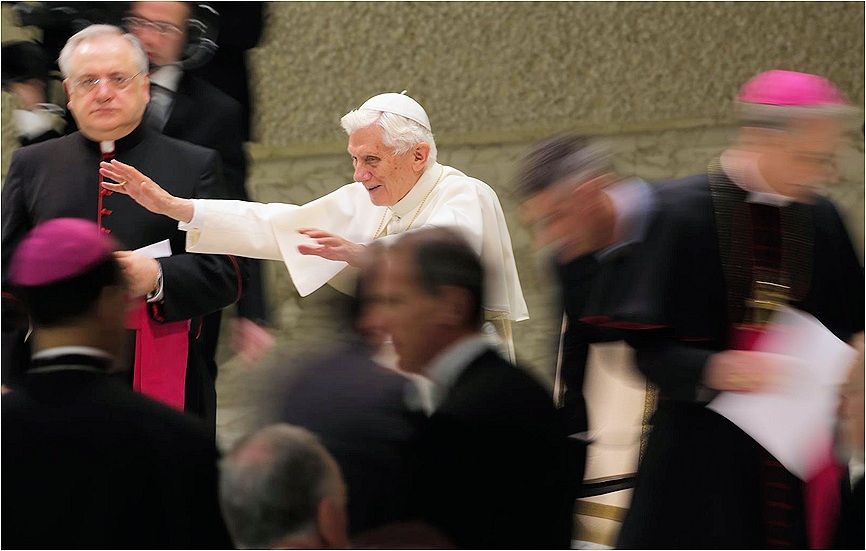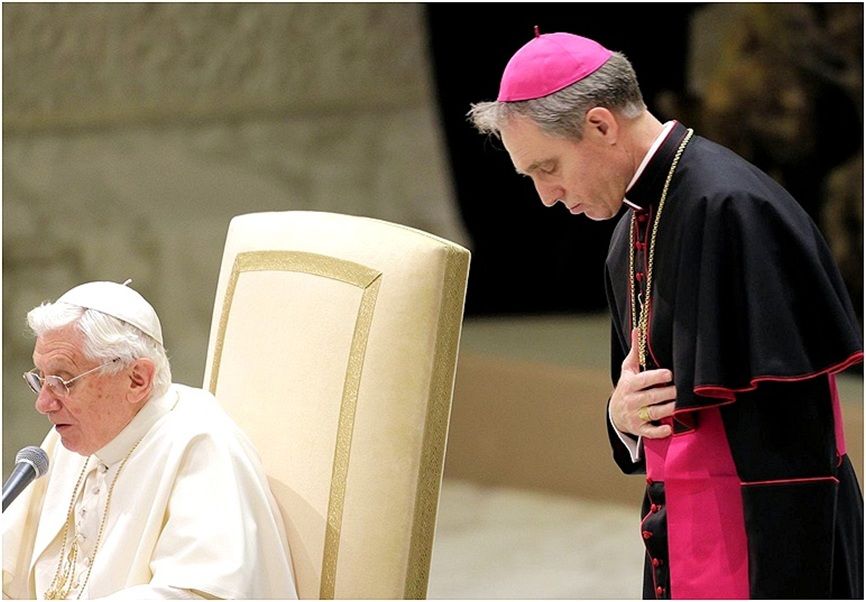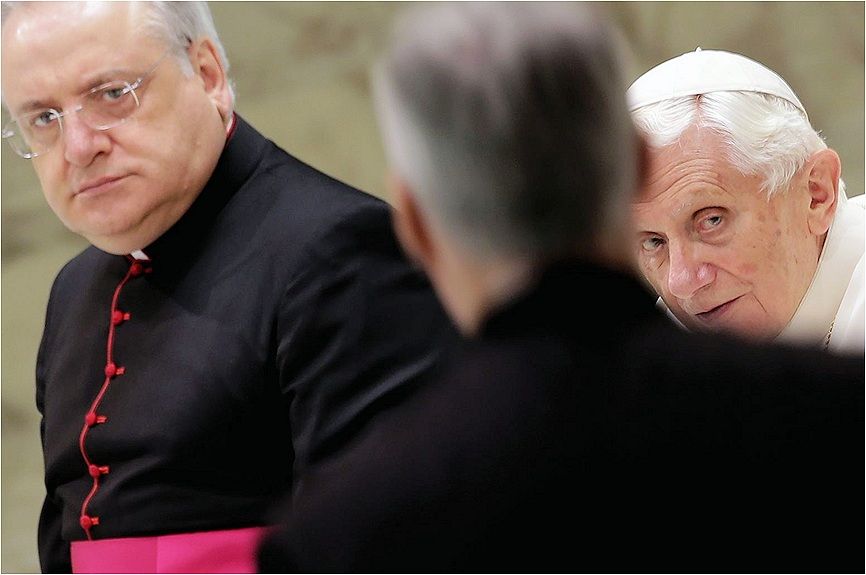| | | OFFLINE | | Post: 26.150
Post: 8.642 | Registrato il: 28/08/2005
Registrato il: 20/01/2009 | Administratore | Utente Master | |
|

 GENERAL AUDIENCE TODAY
GENERAL AUDIENCE TODAY


Pope Benedict XVI began today his catecheses on the articles of faith in the Creed that Catholics profess, as part of his catechetical cycle for the Year of Faith.
In English, he said:
In our catechesis for this Year of Faith, we now turn to the Creed, the solemn profession of our faith as Christians.
At the beginning of the Creed, we say "I believe in God". Faith is our response to the God who first speaks to us, makes himself known and calls us to enter into communion with him. We hear God speaking to us in the Scriptures, which recount the history of his revelation, culminating in the coming of his Son, Jesus Christ.
A central figure in this history of revelation is Abraham, the father and model of all believers (cf. Rom 4:11-12). Sustained by God’s blessing and trusting in his promises, Abraham set off into the unknown.
Like Abraham, we too are called to let faith shape our thoughts and actions in accordance with God’s saving word, even when this runs contrary to the thinking and ways of this world.
With the eyes of faith, we discern God’s presence and his promise of eternal life beyond the realities of this present existence. In opening ourselves to God’s blessing, we become in turn a blessing for others.
After his plurilingual greetings, he reminded the Italian faithful of Friday Vespers on The Feast of the Conversion of St. Paul:
On Friday, we shall celebrate the Feast of the Conversion of St. Paul. Dear young people, may the Apostle Paul be for you a model of integrity in life and of radical faith. Dear persons who are sick, offer your sufferings for the cause of unity in the Church of Christ. And dear newlyweds, be inspired by the life of the Apostle of the Gentiles, by acknowledging the primacy of God and his love in your family life.
He ended by expressing sympathy for the victims of monsoon floods and a dike collapse in the capital of Indonesia:
I am following with concern the news from Indonesia, where a major flood has devastated the capital of Jakarta, resulting in many deaths, thousands of homeless, and great damage.
I wish to express my closeness to the people struck by this natural calamity, assuring them of my prayers, and encouraging solidarity so that no one may lack for necessary aid.

Here is a full translation of the catechesis today:
Dear brothers and sisters,
In this Year of Faith, I wish to start reflecting with you today on the Credo, the solemn profession of faith that accompanies our life as believers.
The Credo begins with “I believe in God”. It is a fundamental affirmation, apparently simple in its essentiality, but which opens to the infinite world of relating to the Lord and his mystery, To believe in God implies adhesion to him, acceptance of his Word, and obedience to his Revelation.
As the Catechism of the Catholic Church teaches: “Faith is a personal act. It is man’s free response to the initiative of God who reveals himself” (No. 166). To be able to say one believes in God is therefore both a gift – God reveals himself, he comes to us – and a commitment. It is divine grace and human responsibility, the experience of a dialog with God who, out of love, “speaks to men as to friends” (Dei verbum, 2), he speaks to us so that, in the faith and with faith, we can enter into communion with him.
Where can we listen to God and his Word? Sacred Scripture is fundamental, in which the Word of God makes itself audible to us and nourishes our life as ‘friends’ of God. All of the Bible recounts God revealing himself to mankind. All of the Bible speaks of faith and teaches us the faith by narrating a story in which God carries forward his plan of redemption and makes himself close to men, through so many luminous figures of persons who believed in him and entrusted themselves to him, up to the fullness of his Revelation in the Lord Jesus.
In this regard, Chapter 11 of the Letter to the Hebrews which we just heard is very beautiful. It speaks about faith and brings to light the great Biblical figures who lived their faith, becoming models for all believers. The first verse says: “Faith is the realization of what is hoped for and evidence of things not seen” (11,1).
The eyes of faith are therefore capable of seeing the invisible, and the heart of the believer can hope beyond hope, just like Abraham, of whom Paul says in the Letter to the Romans, “he believed, hoping against hope” (4,18). And it is on Abraham that I wish to dwell and focus our attention, because he is the first great figure of reference in speaking about faith in God. Abraham, the great patriarch, exemplary model, father of all believers(cfr Rm 4,11-12).
The Letter to the Hebrews presents him thus: “By faith Abraham obeyed when he was called to go out to a place that he was to receive as an inheritance; he went out, not knowing where he was to go. By faith he sojourned in the promised land as in a foreign country, dwelling in tents with Isaac and Jacob, heirs of the same promise; for he was looking forward to the city with foundations, whose architect and maker is God.” (11,8-10).
The author of the Letter to the Hebrews is referring here to the calling of Abraham, narrated in the Book of Genesis, the first book of the Bible, What did God ask of this patriarch? He asked him to leave and abandon his homeland to go towards a place that he would show him. “Go forth from your land, your relatives, and from your father’s house to a land that I will show you” (Gen 12,1).
How would we have responded to a similar call? It meant, in fact, going off into the unknown, not knowing where God would lead him, on a journey that required radical obedience and faith, one to which only faith would accede. But the darkness of the unknown – to which Abraham was going - was lit up by a promise.
God adds to his command a reassuring word which opens to Abraham a future life of fullness. “I will make of you a great nation, and I will bless you; I will make your name great, so that you will be a blessing. .. All the families of the earth will find blessing in you.” (Gen 12,2,3).
A blessing in Sacred Scripture is primarily linked to the gift of life that comes from God and is manifested above all in fecundity, in life that multiplies, from generation to generation. Also linked to blessing is the experience of possessing land, a stable place in which to live and grow in freedom and security, fearing God and constructing a society of men faithful to the Covenant, “a kingdom of priests and holy nation” (cfr Ex 19,6).
And so, Abraham, in the divine plan, is destined to become ‘father of a multitude of peoples’ (Gen 17,5; cfr Rm 4,17-18) and to inhabit a new land. And yet his wife Sarah is sterile, she cannot have children, and the place towards which God would lead him was far from his place of origin – already inhabited by other peoples, and one that would never really belong to him.
The Biblical narrator underscores, though very discreetly, that when Abraham reached the place promised by God, “The Canaanites were then in the land” (Gen 12,6). The land that God gave Abraham did not belong to him, he would be a stranger there and so he would remain, with all that this meant: no prospects of possession, always feeling his poverty, seeing everything as a gift.
This too is the spiritual condition of whoever accepts to follow the Lord, who decides to set off, heeding his call, under the sign of his invisible but powerful blessing. And Abraham, ‘father of believers’, accepts this call, in faith.
St Paul writes in the Letter to the Romans: “He believed, hoping against hope, that he would become 'the father of many nations', according to what was said, ‘Thus shall your descendants be’. He did not weaken in faith when he considered his own body as [already] dead (for he was almost a hundred years old) and the dead womb of Sarah. He did not doubt God’s promise in unbelief; rather, he was empowered by faith and gave glory to God and was fully convinced that what he had promised he was also able to do.” (Rm 4,18-21).
Faith led Abraham towards a paradoxical journey. He would be blessed but without the visible signs of blessing. He received the promise that his descendants would be a great people, but his life was marked by the sterility of his wife Sarah, He was led to a new land where he had to live as a stranger; and the only piece of land he would be allowed to own was that where he would bury Sarah (cfr Gen 23,1-20).
Abraham is blessed because, in his faith, he could discern the divine blessing beyond all appearances, confiding in the presence of God even when his ways appeared mysterious. What does this mean for us?
When we say, “I believe in God”, we are saying as Abraham did: “I trust you, I entrust myself to you, Lord”, but not as to someone to whom we only turn to in times of difficulty, or for whom we only find some time during the day or during the week. To say “I believe in God” means founding my life on him, allowing his Word to orient it every day, in concrete choices, without fear of losing something of myself.
When, in the baptismal rite, the question is asked three times, “Do you believe…” - in God, in Jesus Christ, in the Holy Spirit; in the Holy Catholic Church and other truths of faith – the triple response is in the singular, “I believe”. Because it is my personal existence that must receive a turning-point with the gift of faith, it is my existence that needs to change, to be converted. Everytime that we take part in a Baptism, we must ask ourselves how to live this great gift of faith daily.
Abraham, the believer, teaches us faith; and as a stranger on the land, he shows us the true homeland. Faith makes us pilgrims on earth, placed in the world and in history, but on a journey towards the celestial homeland.
To believe in God therefore makes us bearers of values that often do not conform to the fashion and opinion of the da. It asks us to adopt criteria and behavior that do not fit into the common way of thinking.
The Christian should not be afraid to go ‘against the current’ in order to live his faith, and must resist the temptation to ‘be uniform’ with everyone else. In so many of our societies, God has become the ‘great absentee’ and in his place are many idols, a whole array of idols, most especially, possession and the autonomous “I”.
Even the remarkable and positive progress in science and technology has induced in man the illusion of omnipotence and self-sufficiency, and growing egocentrism has created not a few imbalances in interpersonal relationships and social behavior.
And yet, the thirst for God (cfr Ps 63,2) has not been extinguished, and the Gospel message continues to resonate through the words and work of so many men and women of faith.
Abraham, the father of all believers, continues to be the father of many sons who have chosen to walk in his footsteps and have set off in obedience to divine calling, trusting in the benevolent presence of the Lord, and accepting his blessing in order to be, in turn, a blessing to all.
It is the blessed world of faith to which we are called, to walk fearlessly following the Lord Jesus Christ. It is a journey that is occasionally difficult, that knows trials and even death, but which opens us to life, in a radical transformation of reality that only the eyes of faith can see and enjoy in fullness.
To say “I believe in God” urges us, then, to set forth, to get out of ourselves continually, as Abraham did, in order to bring to the daily reality in which we live that certainty that comes to us from faith: the certainty of the presence of God in history, even today – a presence that brings life and salvation, and which opens to us a future with him for a fullness of life that will never end.

[Modificato da TERESA BENEDETTA 23/01/2013 23:44] |